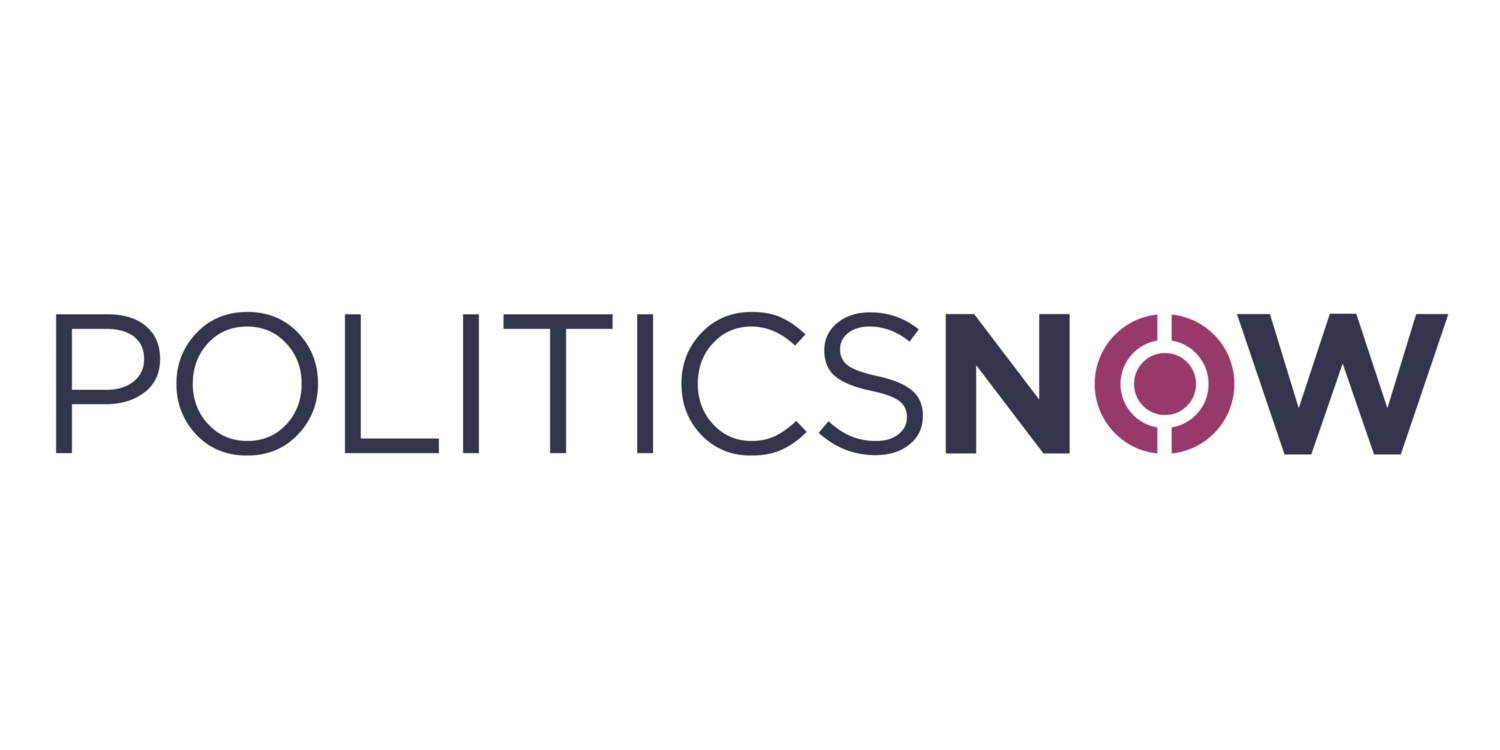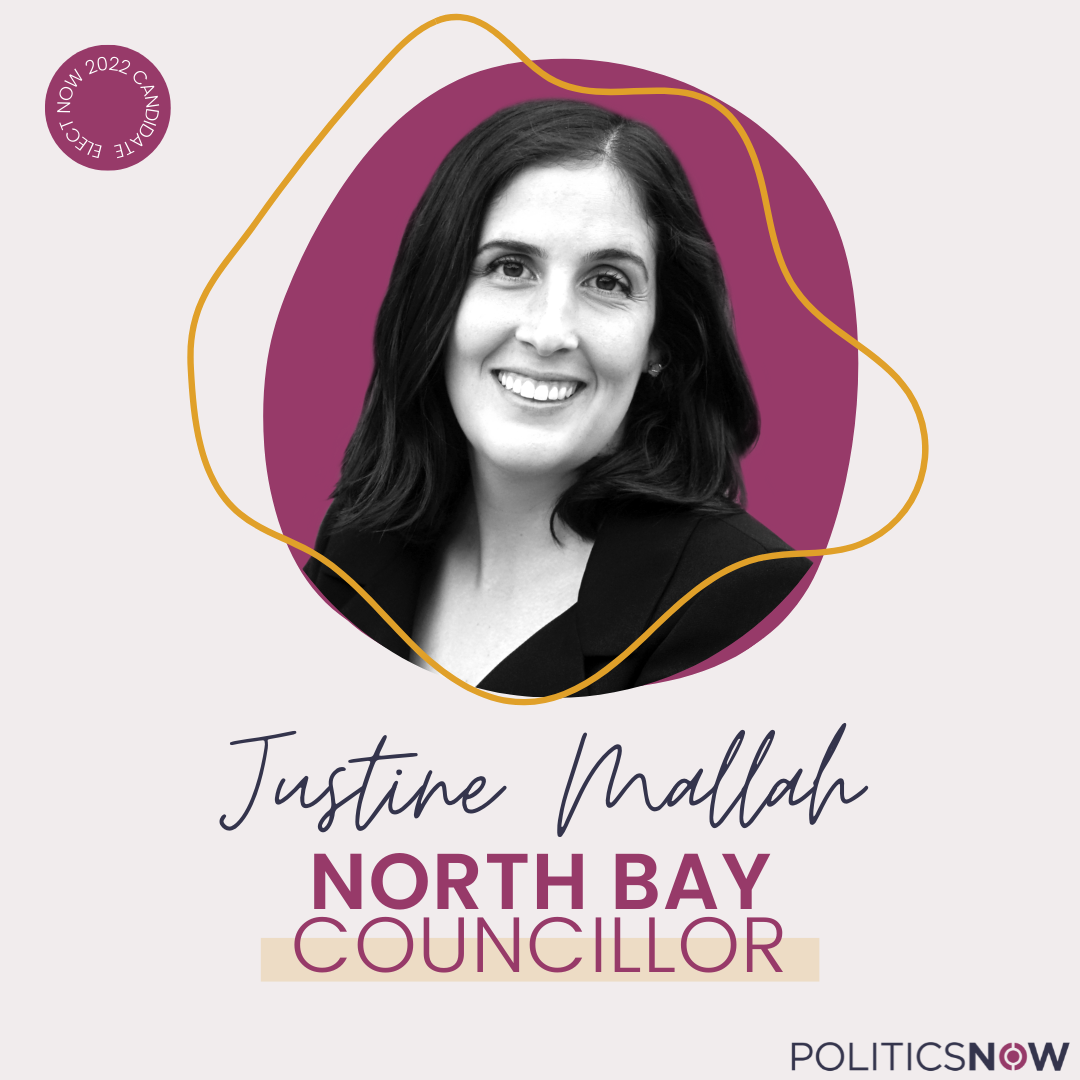Justine Mallah is running for Council in North Bay.
Justine Mallah (she/her) has over eight years of experience in community outreach, political engagement, and health promotion. Justine works in mental health and is the chair of the Violence Against Women Coordinating Committee of Nipissing, co-chair of the Gambling Harm Reduction Partnership of Nipissing and Parry Sound, and a member of North Bay’s Terry Fox Run Planning Committee. Justine is a dedicated supporter of the arts and has facilitated workshops for Art Fix and redeveloped the Gateway Theatre Guild’s website. Before moving to North Bay, Justine managed a charitable organization called Meagan’s Hug, which has raised over $5 million for research into childhood brain tumours. Justine has a Master of Arts degree in Communication and a Graduate Diploma in Health: Science, Technology, and Policy from Carleton University. After her schooling, Justine completed a course in Spain focusing on community development under Dr. Bengt Lindstrom, a leading researcher in the field. In this course, Justine gained tools to help cities identify what is really working (the strengths) and to build, promote, and maximize these strengths to create more community.
Why are you running for this position?
I want to make North Bay a safer, healthier, and more enjoyable place to live. Citizens are the heart of North Bay and deserve a City Council that puts the community first. It’s time we build a safe, vibrant, and prosperous city. A city that brings joy to everyone, and where everyone has a home.
What innovative projects would enhance life in your municipality?
We need to update our zoning bylaws to accommodate micro-housing. Building small houses and housing them through a rent-to-own model is worth exploring. North Bay is in need of more affordable housing options.
If you received a $1 million grant to use for your municipality any way you wanted, what would you do with it?
I would put this money into supporting community groups, organizations, and businesses that want to offer free services and programming to the public.
What do you think are the greatest challenges your municipality faces?
Our region's homeless population is growing and on par (or greater)with much larger centres. We are also experiencing increasingly devastating impacts associated with opioid addiction. These trends reinforce the need for municipal advocacy to increase the funding and resources we have to respond. As a Councillor, I will advocate for more funding from the provincial and federal governments for this important work.
Public dollars need to be spent effectively and efficiently. No more band-aid solutions that don’t get to the core of the issue. We need to be evidence-informed and collaborate. We cannot be driven by assumptions or decisions made in isolation from community service providers who work in the field. Increasing the availability of community housing and addressing the determinants that create conditions for issues, like homelessness, requires coordinated collective input and impact. We need to collaborate across northern communities. Strategies born in a northern context will be most beneficial since the resources, size, and budget of southern Ontario municipalities won’t always be relevant or applicable here. As a City Council, we also can collaborate with larger organizations like the Homeless Hub, CAEH (Built for Zero), and the Northern Policy Institute who help cities address housing issues, challenges with addiction, and mental health issues through effective systems integration planning, evidence-informed interventions, and other best practices. It’s time we learn and work with experts on these complex issues, through a coordinated city-wide approach.
Other than the official ways of communicating (minutes, municipal notes), how else will you reach out to your constituents to involve them in the decision making process?
We need to meet people where they are at. We need to knock on their door, rather than expect them to find us. Most evenings, I spend three to four hours knocking on doors to hear about what people want to see in North Bay. A two-way dialogue is so important to ensure city councillors are adequately doing their job of representing citizens. I will listen to and support the needs of citizens, and serve in the public interest.
We have an aging population in North Bay so we also need to utilize traditional approaches such as articles and notices in local newspapers, magazines, newsletters, the radio and local news channels. Social media is a great tool to engage younger generations in important community issues. It's also incredibly cost-effective and can have a wide reach.
I have been reading City reports to learn more about the inner workings of our municipality. I have also compared North Bay’s reports with those from other municipalities. Despite the fact that I have over seven years of post-secondary education, I cannot always understand the jargon being used in North Bay’s reports. We need to be mindful of literacy levels, draw out key messages and translate these messages thoughtfully through mediums most likely to reach those impacted by the decisions.
What is your favourite thing to do in your municipality?
North Bay has over 100 kilometres of multi-use trails, a ski hill, and two beautiful lakes. I love to spend time outdoors with my husband, Justin, and our poodle, Jiovani. No matter the season, you can frequently find us going for a hike in the bush or walking along the waterfront.
Why do you think it’s important for women to be represented in civic leadership, including on committees, boards and municipal councils?
When politics includes diverse voices, we can look at problems from different angles and come up with a solution that is well-balanced. There is also strong research, according to Women Deliver, that as more women are elected to office, there has been an increase in policies that emphasize quality of life.
What does a ‘feminist city’ mean to you?
A feminist city is one where women are present where plans are formed, decisions are made and action takes place. Similar to members of Indigenous, 2SLGBTQiA+ or racialized communities, women can speak to their unique experience of navigating city policies and spaces; experiences with safety, systemic oppression and discrimination; and what makes a city more inclusive. A feminist city would be reflected in affordable housing; spaces that facilitate community; environments and policies that acknowledge paid and unpaid care (work disproportionately contributed to by women); and community impact on conditions that contribute to poverty.
Please identify the most critical policy, project, or initiative in your platform that addresses systemic barriers faced by women in your municipality, and describe why:
There are so many barriers to individuals being able to move around town physically. Without consistent and safe sidewalks, young people, people with strollers, and people with mobile aids may experience barriers to movement. On more than one occasion in the winter, I have witnessed people struggle to use their wheelchairs on sidewalks. This isn’t equitable. Additionally, at certain times of the week, North Bay buses only run once an hour. We need to explore options for increasing transit times. How is this a gender issue? Studies show that more women tend to walk or use public transport and men are more likely to drive.


